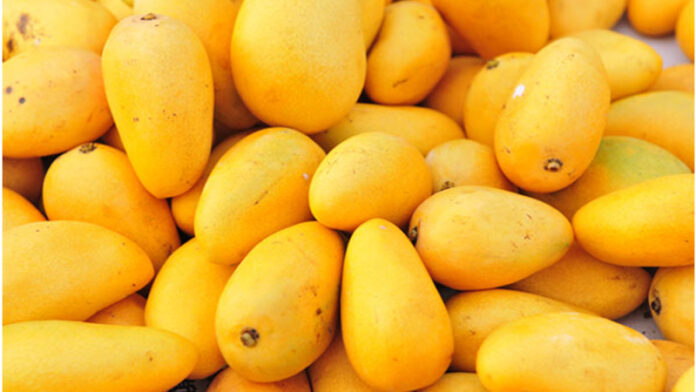ISLAMABAD: In a perplexing turn of events, mango exports to Iran have resumed once again after a month-long suspension attributed to the closure of treatment plants. This resurgence comes shortly after a change in government, raising eyebrows over the suddenness of the decision. This decision also places a question mark on the alleged absence of “hot water treatment” for the exported fruit.
Hot water treatment for mangoes is a post-harvest treatment process used to control pests and diseases in the fruit. It involves immersing mangoes in hot water at a specific temperature and duration to eliminate or reduce the presence of insects, larvae, and pathogens on the fruit’s surface. This treatment is primarily used for mangoes intended for export to meet the phytosanitary regulations of importing countries.
Under Iranian phyto standards, mangoes require hot water treatment to prevent the spread of pests and diseases. It was alleged that mangoes being produced in Pakistan were not getting the HWT from an approved plant of the Department of Plant Protection (DPP) hence their export was halted. However the resumption of export going through a single plant has caught exporters and competing plants by surprise.
Numerous mango exporters, particularly from Multan, have come forward with severe concerns about the resumption of exports without the mandated treatment process. The exporters fear that the plant might still be in violation of Iran’s phyto standards even though it has the DPP’s approval.
The mango exporters claimed that a specific HWT plant had approval from the Department of Plant Protection (DPP) to issue certificates, wherein the facility wasn’t even performing the required treatment as per these exporters.
What is more interesting is that Pakistan does have the capacity to provide this treatment. However, apart from a single HWT plant based in Karachi, no other facility in the country (out of 19 in total) was actively treating mangoes previously due to the rigorous and frequently changing treatment criteria set by the DPP.
Other plant owners have also raised questions about the apparent favouritism shown to the Karachi-based HWT plant by the DPP earlier, allowing it to treat and export mangoes while others struggled to meet the ever changing standards.
Babar Durrani, the owner of Durrani HWT plant in Sindh, expressed his bewilderment over the perceived double standard, citing that his plant had been working to meet the DPP’s criteria. “We are trying to meet the SOPs set by DPP,” he said, indicating that even his plant has not yet begun mango treatment.
Exporters voiced concerns about the feasibility of treating such a large quantity of mangoes from a single plant within a short timeframe, further casting doubt on the integrity of the process. Skepticism grew as reports emerged that multiple trucks loaded with mangoes from Multan had already reached Quetta and were en route to the Taftan border for onward export to Iran.
When questioned, Ali Asghar, the Director of Quarantine at the DPP, claimed to be unaware of the situation due to his leave. On the other hand, Abid Alla Deta, the Director General of the DPP, stated that the department had not suspended any HWT plants and emphasised that only treated mangoes would be permitted for export to Iran.
The suspension of several HWT plants due to stringent and fluctuating Standard Operating Procedures (SOPs) issued by the DPP has led to significant losses for exporters and growers. Notably, HWT plants in Sindh, dealing with the Sindhri mango variety, continued operations while those in Punjab struggled due to treatment issues.
HWT plant owners criticised the DPP’s insistence on using portable sensors alongside the central command system for temperature monitoring during treatment. They argued that the portable sensors were susceptible to damage, and costly to replace. This lack of willingness to upgrade on the plant-owners’ part, resulted in the closure of multiple HWT plants in Multan, exacerbating the challenges faced by exporters and mango growers.
As the crisis escalates, concerns have been raised about the potential financial losses to farmers and the country’s economy if the prized Chaunsa White mango variety cannot be exported to Iran. Exporters have urged authorities to reevaluate the monitoring regime and permit HWT plants to adhere to the stipulated SOPs to ensure the continuation of the mango export industry and safeguard stakeholders’ interests.
Amid economic hardships, addressing this issue promptly is crucial to secure a significant revenue stream for the nation. It is difficult to determine who amongst the plant owners or the DPP is at fault when it comes to meeting the SOPs. However, any favouritism given to any business not meeting criterion, not only reduces the DPP’s credibility but also puts future exports at risk. As the situation unfolds, the intersection of government policies, private interests, and the integrity of mango exports remains a subject of intense scrutiny and debate.





good news!
sir please share me details about Ehsaas program and bisp
Radiating positivity through pixels! ✨📸 Embracing the beauty of simplicity with this new WhatsApp DP. Let’s keep the good vibes flowing and the smiles shining. 😊🌈 #PositiveVibesOnly #NewDP #WhatsAppSmiles